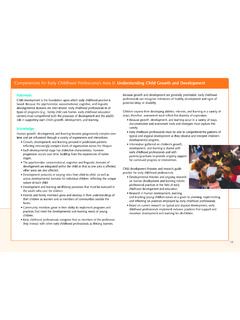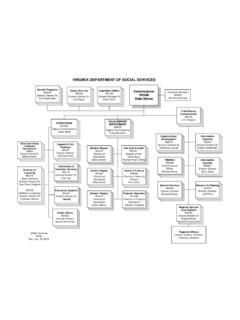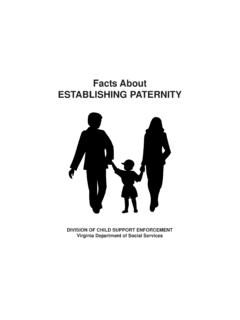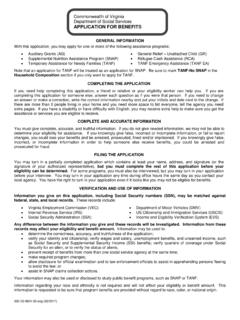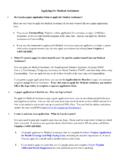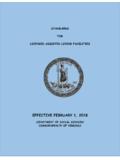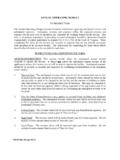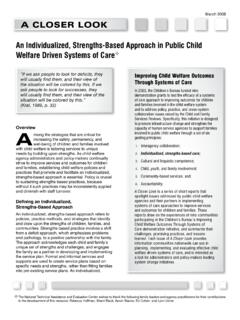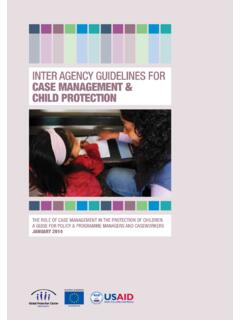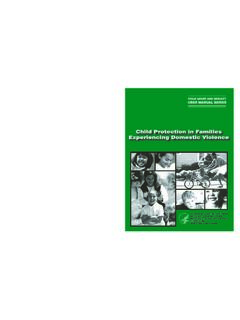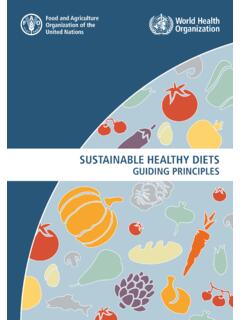Transcription of Milestones of Child Development - Virginia
1 Virginia s Early Childhood Development Alignment ProjectMilestones of Child DevelopmentA Guide to Young Children s Learning and Development from Birth to Kindergarten Milestones of Child DevelopmentA Guide to Young Children s Learning and Development from Birth to Kindergarten Virginia s Early Childhood Development Alignment ProjectCOPYRIGHT 2008 Office of Early Childhood DevelopmentVirginia Department of Social ServicesRevised 2013 Virginia Early Childhood Foundation for the Virginia Early Childhood Advisory CouncilWe encourage replication and use of these materials for non-profit of Early Childhood DevelopmentVirginia Department of Social Services801 E. Main StreetRichmond, Virginia 23219-2901 Introduction iOverview of Domain Indicators and Strands 1 Comprehensive Milestones of Child Development 45 Social and Emotional Development 47 Strand 1 Relationships with Others 48 Strand 2 Learning about Self (Self-Concept)
2 51 Strand 3 Emotion Regulation and Self-Regulation 54 Approaches to Learning 57 Strand 1 Persistence 58 Strand 2 Curiosity and Initiative 60 Strand 3 Creativity and Inventiveness 62 Strand 4 Reasoning and Problem-Solving 65 Language and Literacy 69 Strand 1 Listening and Speaking 70 Strand 2 Phonological Awareness and Alphabetic Knowledge 73 Strand 3 Print Awareness and Concepts 76 Stand 4 Comprehension 78 Strand 5 Early Writing 80 Cognition and General Knowledge 83 Strand 1 Learning About Mathematical Concepts 84 Sub-Strand A Numbers and Operations 84 Sub-Strand B Measurement 86 Sub-Strand C Patterns and Relationships 89 Sub-Strand D Shapes 91 Sub-Strand E Spatial Sense 93 Sub-Strand F Data Collection and Analysis 94 Sub-Strand G Time and Sequence 96 Strand 2 Learning About the World 98 Sub-Strand A Scientific Knowledge 98 Sub-Strand B Scientific Inquiry and Exploration 100 Strand 3 Learning About Families and Communities 103 Sub-Strand A History 103 Sub-Strand B Geography 105 Sub-Strand C Economics 107 Sub-Strand D Families
3 And Communities 108 Fine Arts 111 Strand 1 Dance Arts 112 Strand 2 Music 114 Strand 3 Theater Arts 116 Strand 4 Visual Arts 118 Physical Development and Health 121 Strand 1 Gross Motor Development 122 Strand 2 Fine Motor Development 125 Strand 3 Health and Well-Being 128 Glossary 131 References 135 Documents Reviewed 137 Table of ContentsIntroduction Without a doubt, the early years from birth to kindergarten comprise the most extraordinary period of Development in a Child s lifetime.
4 Learning begins in infancy when a Child s Development of knowledge, skills, and attitudes toward learning serves as the basis for healthy Development and lifelong achievement. Infants and young children are by nature avid learners enthusiastic, creative scientists who observe, explore, experiment, and practice skills until they are mastered, and then continue to the next challenge. Although they learn much through independent exploration, infants and young children need competent adult guides to provide the critical elements of high quality learning environments at optimal times. Skillful adults, including parents, grandparents, Child care providers and teachers, provide the safety and security, both physical and emotional, that support young learners through adventures of discovery and mastery.
5 Skillful adults provide warm, responsive relationships that foster confidence as they respond to children s needs consistently. They structure the environment to provide maximum opportunities for children to learn, and provide enriched language interactions with meaningful conversation and feedback to foster optimal Development . These dedicated adults become learning partners who guide and support young children as they explore the world in which they is vital that we support Virginia s young children as they prepare for school and life success. The Alignment Project documents serve as guides to assist adults in their important roles with young PrinciplesThe Alignment Project documents reflect a set of guiding principles that have served as a valuable compass in developing these resources:1.
6 Families are the first and most influential teachers of young Every Child develops at an individual rate, possesses unique characteristics, and exhibits an array of talents and interests regardless of family background, culture, special need, experience, or ability. 3. Optimal learning occurs when we recognize that all aspects of a Child s Development ( , social and emotional, approaches to learning, language and literacy, cognitive, and physical) are inextricably interrelated and nurtured through a combination of active exploration, play, social interaction, and thoughtfully planned activities that capitalize on children s natural tendency to seek ever higher levels of challenge to s Alignment Projecti4. Early learning experiences draw upon and enhance the connections between families, early childhood programs and services, schools, and the Quality early learning experiences for children are guided by research-based knowledge and practice.
7 6. All children are capable and competent learners, and they learn best when they are included with their of August 2013, the Milestones have been revised to reflect current research that shows children s need for positive, responsive relationships with adults who use effective strategies to stimulate language Development and boost self-regulation. The ability to take turns, get along with others, follow directions and control emotions helps children more easily gain the cognitive skills that will help them thrive in school. Children who can regulate emotions and delay gratification will be better able to focus on learning and adjust to the expectations of social situations. In the same way, children who enter school with strong language skills will be able to do much more than communicate with others.
8 They will be able to use thinking skills (words) to direct their plans and actions, remember what worked for them in the past, and be more able to solve problems with others. The new focus on language and self-regulation will help ensure that all children have an equal chance to develop to their full potential. iiDeveloping the Alignment Project DocumentsThese frameworks were developed through a comprehensive and collaborative process involving many sources of information, expertise, and process began in February, 2006, through an intensive initiative known as the Alignment Project. Though spearheaded by the Virginia Department of Social Services, the Alignment Project team is comprised of dedicated professionals from many agencies and organizations, both public and private.
9 Each of the team members brought insight and wisdom reflecting years of experience, expertise, and the Development of the initial draft documents, critical reviews were conducted by numerous early childhood professionals who provided feedback and suggestions for improvement. In addition, six focus groups were held in six different regions across the Commonwealth to gather broad feedback on the Alignment work, as well as specific feedback concerning draft documents. The participating individuals represented various relevant constituent groups, selected to offer a full range of perspectives, thereby ensuring inclusion and integration of varied needs, programs, and cultures to the greatest extent possible. Working within a tight timeframe, the reviewers provided valuable edits and additions, contributing substantively to the final , the Alignment Project benefited in significant ways by reviewing and incorporating guidelines and competencies gleaned from early childhood initiatives from numerous states and local coalitions.
10 Thanks to the graciousness and generosity of key representatives from each state and locality in granting permission for the team to learn from their respective processes and products, the Alignment Team feels assured that Virginia s frameworks reflect best practices across the initial framework was published in 2008, with a revised edition distributed in August, Alignment Project Team wishes to express gratitude to the following individuals who contributed to the Development of Virginia s Milestones of Child Development :Alignment Project TeamMark Allan, Virginia Department of EducationZelda Boyd, Virginia Department of Social ServicesTanya High Brooks, United Way Success by 6*Elizabeth Crawford, 2006 Governor s FellowKathy Gillikin, Virginia Department of Social ServicesKathy Glazer, Virginia Department of Social Services and Secretariat of Education*Teresa Harris, James Madison UniversityCori Hill, Partnership for People with DisabilitiesArlene Kasper, Virginia Department of Social ServicesAleta Lawson, Virginia Department of Social ServicesKathy Massie, Virginia Head Start AssociationDavid Mills, Virginia Department of Mental Health, Mental Retardation and Substance Abuse ServicesPhyllis Mondak, Virginia Department of EducationHelen O Beirne.
